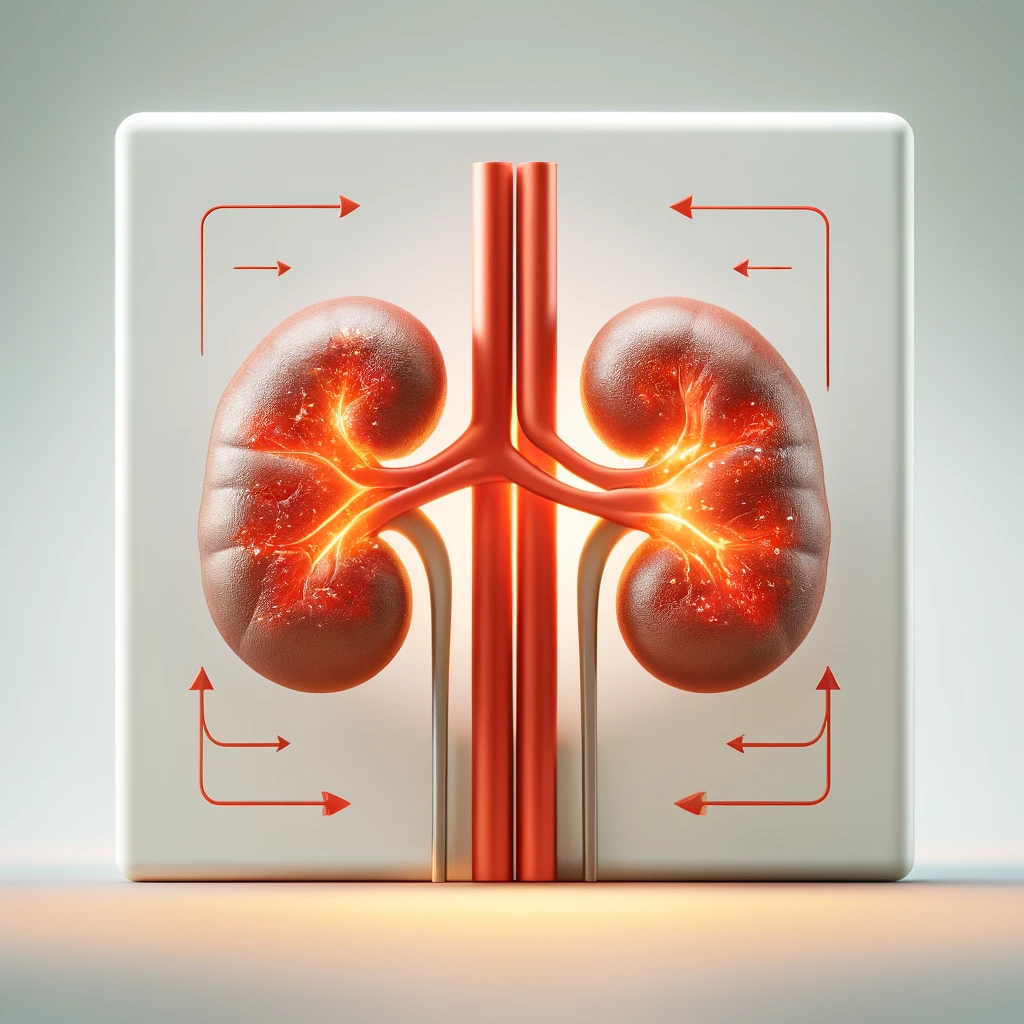
Chronic Kidney Disease (CKD) is a progressive condition characterized by the gradual loss of kidney function over time. One of the critical factors contributing to the progression of CKD is inflammation. Inflammation in CKD is not merely a consequence of decreased renal function but also an active contributor to the disease’s advancement.
Mechanisms of Inflammation in CKD
Inflammation in CKD is a complex process involving both innate and adaptive immune responses. Several factors contribute to the heightened inflammatory state observed in CKD patients:
- Uremic Toxins: As kidney function declines, the accumulation of uremic toxins such as indoxyl sulfate and p-cresyl sulfate stimulates the production of pro-inflammatory cytokines. These toxins activate inflammatory pathways in various cell types, including endothelial cells and monocytes, promoting a chronic inflammatory state.
- Oxidative Stress: CKD is associated with increased oxidative stress, characterized by an imbalance between the production of reactive oxygen species (ROS) and antioxidant defenses. ROS can activate nuclear factor kappa B (NF-κB), a key transcription factor that regulates the expression of many pro-inflammatory genes.
- Dialysis-Related Factors: Hemodialysis, a common treatment for advanced CKD, can itself be a source of inflammation. The biocompatibility of dialysis membranes, endotoxin contamination in dialysate, and repeated vascular access can trigger inflammatory responses.
- Microbiota Dysbiosis: Changes in gut microbiota composition, common in CKD patients, can lead to increased translocation of endotoxins into the bloodstream, further fueling systemic inflammation.
Biomarkers of Inflammation in CKD
Monitoring inflammation in CKD patients is crucial for assessing disease progression and tailoring therapeutic interventions. Several biomarkers have been identified as indicators of inflammation in CKD:
- C-Reactive Protein (CRP): CRP is a widely used marker of systemic inflammation. Elevated levels of CRP are associated with increased risk of cardiovascular events and faster progression of CKD.
- Interleukin-6 (IL-6): IL-6 is a pro-inflammatory cytokine that plays a central role in the inflammatory cascade. High levels of IL-6 correlate with worse renal outcomes and are predictive of mortality in CKD patients.
- Tumor Necrosis Factor-alpha (TNF-α): TNF-α is another critical cytokine in the inflammatory response. Elevated TNF-α levels are linked to increased catabolism, muscle wasting, and progression of renal disease.
- Fibrinogen: As an acute-phase reactant, fibrinogen levels rise during systemic inflammation. Increased fibrinogen levels in CKD patients are associated with higher cardiovascular risk and disease progression.
Therapeutic Strategies to Mitigate Inflammation
Addressing inflammation in CKD requires a multifaceted approach, targeting both the sources of inflammation and the downstream effects. Several strategies have been explored:
- Anti-Inflammatory Medications: Nonsteroidal anti-inflammatory drugs (NSAIDs) are generally avoided in CKD due to nephrotoxicity. However, selective COX-2 inhibitors and corticosteroids may be used cautiously to reduce inflammation.
- Statins: Statins, commonly used for lipid management, also possess anti-inflammatory properties. They can lower CRP levels and have been shown to reduce cardiovascular events in CKD patients.
- Antioxidants: Supplementation with antioxidants such as vitamin E and N-acetylcysteine can help counteract oxidative stress, thereby reducing inflammation.
- Dietary Interventions: Dietary modifications, including reduced intake of advanced glycation end products (AGEs) and increased consumption of anti-inflammatory foods (e.g., fruits, vegetables, and omega-3 fatty acids), can mitigate inflammation.
- Microbiota Modulation: Probiotics and prebiotics can help restore a healthy gut microbiota, reducing endotoxin translocation and systemic inflammation.
- Exercise: Regular physical activity has anti-inflammatory effects and can improve overall cardiovascular health, which is beneficial for CKD patients.
Conclusion
Inflammation plays a pivotal role in the progression of CKD, influenced by uremic toxins, oxidative stress, dialysis-related factors, and microbiota dysbiosis. Monitoring inflammatory biomarkers such as CRP, IL-6, TNF-α, and fibrinogen is essential for managing CKD. Therapeutic strategies to mitigate inflammation include the use of anti-inflammatory medications, statins, antioxidants, dietary interventions, microbiota modulation, and regular exercise.
Quiz
Please note that our articles are not intended to guide personal health decisions.
This content has been curated by Renes Care. Unauthorized use or reproduction is prohibited.
© Renes Care. All rights reserved.
